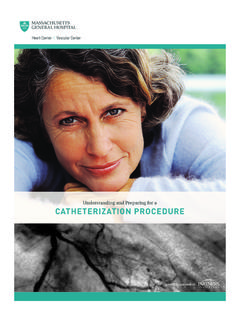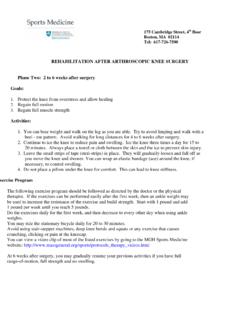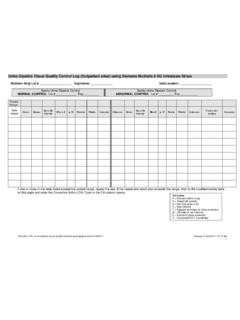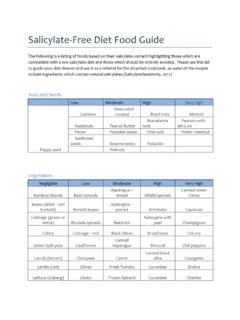Transcription of Colon Cancer Surgery and Recovery - massgeneral.org
1 Colon Cancer Surgery and Recovery A Guide for Patients and Families This Booklet You are receiving this booklet because you will be having Surgery shortly. This booklet tells you what to do before, during, and after Surgery . It also describes your daily goals while you are in the hospital. Welcome Welcome to Mass General Hospital. Our hospital has brought together a team of experts in Cancer care. Our team constantly reviews the latest research to look for ways to improve treatment. From this research, we have developed standard guidelines for the treatment of Colon Cancer . All of Mass General's oncologists, radiation oncologists, surgeons, and nurses follow these guidelines. This helps make sure that our patients get the best possible care for their Cancer .
2 Colon Cancer Surgery The treatment of Colon Cancer keeps improving. For example, for some patients, Surgery can now be done through smaller incisions. Although Colon Surgery is considered major Surgery , most patients do not have problems afterwards. Many patients go home within 2-to-4 days after Surgery . Table of Contents Getting Ready for Surgery .. 4. Colon Cancer Surgery .. 4. How can I get ready for Surgery ? .. 5. Anesthesia .. 6. Preoperative Evaluation .. 6. 1-to-2 Days Before Surgery .. 7. The Day of Surgery .. 8. Arriving at the Hospital .. 8. The Preoperative Holding Area .. 8. In the Operating Room .. 9. The Surgery .. 10. After Your Surgery .. 10. In the PACU .. 11. Recovering from Surgery .. 12. Your Daily Goals Checklist .. 12. Taking Care of Your Pain During Recovery .
3 14. Problems after Surgery .. 15. Getting Ready for Discharge .. 16. When can I go home? .. 16. Your Care Coordinator .. 17. Discharge Instructions .. 18. At Home .. 19. What should I expect after discharge? .. 19. When should I call my surgeon? .. 19. We Are Here to Help .. 20. Getting Ready for Surgery Colon Cancer Surgery Most people with Colon Cancer need Surgery to remove part of their Colon . Some may be helped by chemotherapy before or after Surgery . A few may have only chemotherapy. Once you have been diagnosed with Colon Cancer , you will be scheduled for testing to decide your treatment plan. A. nurse will also meet with you to go over the care pathway. The care pathway is a step-by-step plan for your care. When possible, this meeting will be the same day as your clinic appointment.
4 The Care Pathway The care pathway is different for each patient. For example, some patients will see an oncologist and a surgeon at the clinic before Surgery . Others may have an appointment with a surgeon at the surgeon's clinic or office. Page 4. Getting Ready for Surgery How can I get ready for Surgery ? Here are some things you can do now that will help you get ready for Surgery . Good Nutrition Good nutrition before Surgery can help with your Recovery . To help with healing, eat and drink plenty of protein and vitamin C. Good places to get protein are fish, chicken, beans, nuts, and whole grains. Good places to get vitamin C are citrus fruits or citrus juices, berries, green and red peppers, tomatoes, broccoli, and spinach. If you are not on a special diet for other medical reasons, try adding 1-to-3 nutritional drinks to your diet each day.
5 Some examples are Ensure or Boost. This is especially important if you have lost more than 15 pounds recently or are over the age of 75. If you are overweight, losing weight before Surgery will make the Surgery safer for you. Stop Smoking If you smoke or use tobacco products, stop or at least try to cut down. Not smoking will help make your Recovery easier. Ask your doctor about prescription medicines that can help you quit. Stop Drinking Alcohol Not drinking alcohol also makes Recovery easier. Avoid or at least decrease the amount of alcohol you drink before your Surgery . Page 5. Getting Ready for Surgery Anesthesia For your Surgery , you will need anesthesia. This is medicine to make you feel relaxed, to control your pain, and to keep you asleep during Surgery .
6 Anesthesia is given by an anesthesiologist. This is a doctor who specializes in this medicine. Mass General's anesthesiologists are part of our Cancer Care Team. Preoperative Evaluation Before Surgery , you will have a preoperative evaluation with nurses, nurse practitioners, anesthesiologists, and technologists. During this meeting: Your medical and surgical histories and medicines will be reviewed. You will be asked to have some tests. This will make sure your anesthesia and Surgery are as safe as possible. The tests may include: a physical examination, blood tests, and an EKG. If you have heart or lung problems or if the team has any concerns, you may be asked to see a specialist or have more tests. Before your Surgery , please ask your anesthesiologist any questions you may have!
7 Page 6. Getting Ready for Surgery 1-to-2 Days Before Surgery Read your instructions ahead of time to see what your surgical team wants you to do. Follow the instructions carefully to get ready for your Surgery . Make sure that you: Eat only what your surgeon tells you to. This is usually a clear liquid diet. This diet has fluids and foods that turn to liquid when they are at room temperature. This includes: clear soups, sports drinks, black tea or coffee, clear juices, and any Jell-O that is not red. Do not eat or drink anything after midnight on the day before your Surgery . Do not drink alcohol or smoke cigarettes during the last 24 hours before your Surgery . Plan to come to the hospital at least 2 hours before your Surgery . Your surgeon's office will tell you the exact time to be there.
8 Bowel Clean-Out Your surgeon may also ask you to have a bowel clean-out. For this, you may need a laxative drink, laxative pills, or an enema to help empty your bowel before Surgery . You may also be asked to take some antibiotic pills before your Surgery . Page 7. The Day of Surgery Arriving at the Hospital When you arrive at the hospital, go the Admitting Department. Once you are checked in, you will be given directions to the Preoperative Holding Area. The Preoperative Holding Area Here, you will meet your surgical team. You will have an IV put in your arm. An IV is a soft flexible tube that you will get medicines and fluid through. Some patients will have an epidural catheter put in by their anesthesiologist. This catheter is put in the back with a small needle.
9 It is an easy way to give pain medicine during Surgery . Page 8. The Day of Surgery In the Operating Room In the operating room, the lights will be bright and the room temperature cool. This is what you can expect: Your nurse will give you a warm blanket to make sure you are comfortable. Small paper sticky pads will be put on your chest. They are attached to a monitor so that your heart can be watched. A blood pressure cuff will be put on your arm. It will check your blood pressure every few minutes. A probe will be placed on your finger to check how much oxygen is in your blood. You will be given extra oxygen to breathe through a mask. Your anesthesiologist will give you medicine through your IV. It will make you go into a deep sleep. Your nurse will be near you as you go to sleep.
10 Page 9. The Day of Surgery The Surgery Once you are asleep, your surgeon will perform the operation that was discussed with you. Mass General's Colon Cancer surgeons follow guidelines to help avoid problems and make you as safe as possible! After Your Surgery When you wake up, your Surgery will be over and a nurse will be taking care of you. The first thing you remember will probably be in the PACU or post anesthesia care unit. You may have heard the PACU called the Recovery room in the past. Usually your family may come and see you in the PACU. for a short visit. Page 10. The Day of Surgery In the PACU. In the PACU, you may have many of the following: An oxygen mask or oxygen prongs that go in your nose An IV in your hand, arm, or neck An epidural catheter in your back A bladder catheter to drain your urine Inflating boots on your legs to prevent blood clots A heart monitor with sticky pads attached to your chest A blood pressure cuff on your arm to watch your blood pressure A probe attached to your finger to measure the oxygen in your blood A dressing over your incisions Some patients will have a small tube in their nose.












